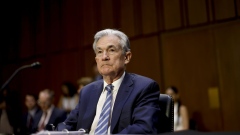Jan 28, 2021
GameStop's ‘French Revolution’ is a crypto-farce: Lionel Laurent
, Bloomberg News
GameStop is a sideshow to real market opportunities: John Goldsmith
The worry is that, rather than a glorious decentralization of finance, what seems to be unfolding here is a crypto-esque farce combining volatile trading and chatroom-driven tips reminiscent of cryptocurrencies like Bitcoin and penny stocks all in a market juiced by pandemic stimulus. The U.S. Securities & Exchange Commission says it’s “actively monitoring” options and equities markets after a surreal few days that saw GameStop’s once-unloved retail chain skyrocket in value, forcing funds to unwind short positions at a loss.
These are obviously existential times for the regulators themselves, not just traders. The SEC’s terse statement was openly mocked on Reddit — one post on the WallStreetBets forum called the watchdog "government poodle regulators.” Far cruder comments garnered more muscular intervention by communications platform Discord, which banned WallStreetBets’s server over what it called “hateful and discriminatory content after repeated warnings.” Gaining high-profile attention for both potential financial wrongdoing and online hate speech is a huge turn of events for what was described last year as a “dingy corner of the internet” by Bloomberg Businessweek.
As icky as the optics might seem to call in the regulatory cavalry after a bad day for wealthy hedge fund managers, the online backlash against a supposed establishment conspiracy to crack down on the little guy is pretty hypocritical too. It buys into the narrative that this really is a populist social uprising rather than simple day trading on a regulated market, whose rules — such as the disclosure of bearish short-selling bets, which while voluntary in the U.S. must be reported in the European Union — clearly weren’t all bad for Redditors’ strategy of targeting excessively beaten-up companies.
Fans of WallStreetBets have been keen to describe what it does in highfalutin terms — “community x capital” or “decentralized finance” — but you’d have to squint really hard to view the moral clarity of sharing options trading ideas for investors.
Punting on stocks in lockdown isn't always fun and games: Tales of day trader blowups abound, and one apparent suicide last year attracted political scrutiny. Speculatively buying call options in a market that seemed like it could only go up had turned small traders into the biggest part of the options market, according to Barron’s. The us-versus-them narrative ignores that money is being made by firms on all sides of this craze. Popular trading app Robinhood recently paid US$65 million for failing to disclose to customers that their orders were being routed to trading firms for payment.
Could actual rule-breaking or market manipulation be happening, though? Clearly even Redditors believe in some kind of quality control to block off bad actors, given the presence of moderators. One of them told Newsweek that they use a “number of automated tools” to keep things legit. But human nature is as constant as the march of technology. In 2001, the SEC reached a US$285,000 settlement with a 15-year-old high-school student who had posted hundreds of enthusiastic online messages under several names to pump his portfolio. Since then, the discourse has become more meme-y — “hold strong, you beautiful degenerates” — but hardly immune to manipulation.
It’s an open question as to what financial regulators will find as they comb through memes, emojis and “loss porn” if they’re ready to look close enough. Unfortunately, it’s easier to list regulatory failures than successes over the years: If prominent blue-chip companies including Germany’s Wirecard have collapsed under the weight of their own lies, it’s often thanks to whistleblowers, journalists and short sellers (so hated by WallStreetBets) rather than the watchdogs who also have their blind spots.
Yet it’s also pretty cynical to assume there is no benefit to trying to enforce rules. Financial scams prey on the vulnerable and COVID-19 has added to their ranks: As of Oct. 23, Americans had lost US$161 million to Covid-related scams, Britons the equivalent of US$21.8 million and Australians more than US$3.6 million. Senator Elizabeth Warren, no fan of hedge funds or banks, has called on regulators to “wake up and do their jobs.” The “tragedy of the commons” may strike if regulators don’t even seem to be trying to learn from their past failures.
And, as boring as it sounds, even Redditors should appreciate the value of rules. When Kasparov finally won his game against “the rest of the world,” he declared it the best game of his life. If WallStreetBets is checkmate for old-school finance, then surely they'd want to win fair and square.
(This column was corrected to clarify short selling disclosure rules in the fourth paragraph. )
To contact the author of this story:
Lionel Laurent at llaurent2@bloomberg.net





